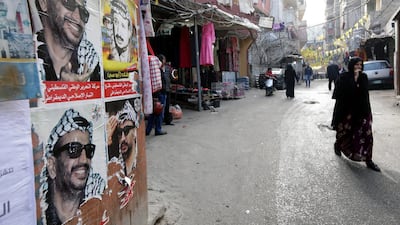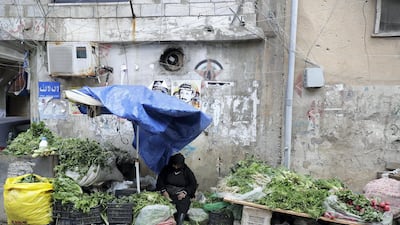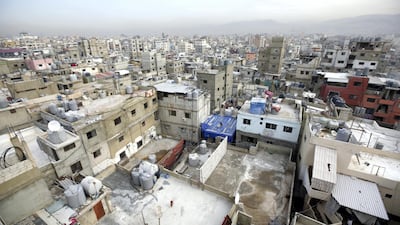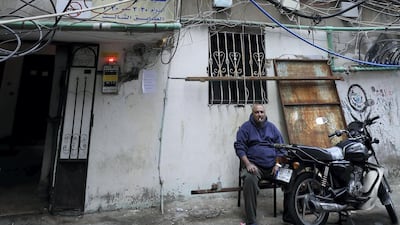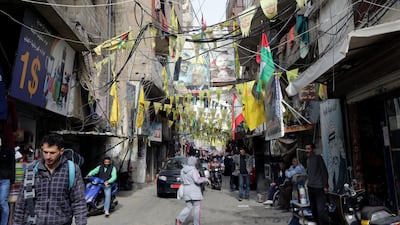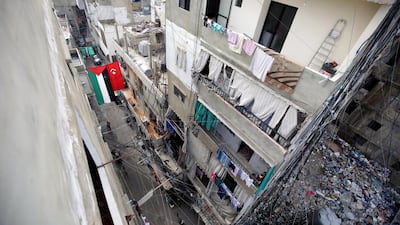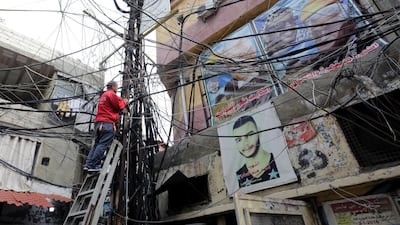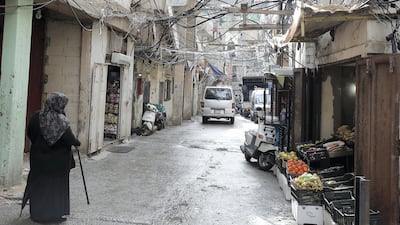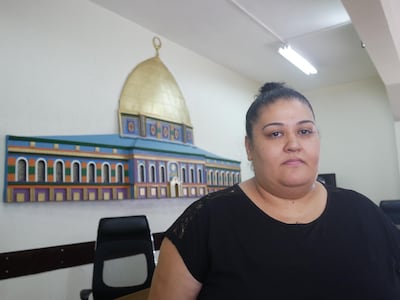Living in one of Beirut’s sprawling refugee camps surrounded by the threat of violence, Hanan Barakji has always kept a grab bag close to hand.
The small rucksacks typically contain valuable possessions like jewellery and passports; items anyone would want to keep hold of if forced to flee at a moment’s notice.
Such has been Ms Barakji’s way of life for more than three decades. The tenacious, dedicated social worker, now 35, has lived in Burj Al Barajneh refugee camp in Lebanon all her life.
Her work, which involves looking after thousands of Palestinian and Syrian exiles who have escaped persecution and conflict, is not for the faint-hearted.
"Conditions in the camps are very difficult - we have a lot of social, psychological, economic and even political problems," Ms Barakji told The National via a translator.
“Drug abuse and violence are a big problem and there are guns everywhere. This puts everyone who lives and works [in the camp] under a lot of pressure.”
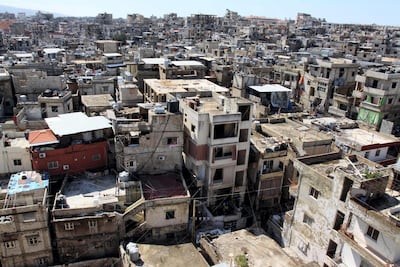
Ms Barakji, who is Palestinian, has seen more than her fair share of suffering and anguish while working for the Palestinian Red Crescent.
Yet until now - given the difficulties she faces every day – little, or even no thought has ever been given to her own happiness and wellbeing.
Fortunately, however, this is now beginning to change. Twelve months ago, the first ‘Help the Helpers’ support programme was established and they have since been rolled out at refugee settlements across Lebanon.
Backed by the International Committee of the Red Cross, the initiative uses workshops to assist medics, nurses and social workers on how to cope with the trauma of working in such difficult circumstances.
The scheme is, at long-last, an acknowledgement that long-term exposure to violence and hardship can have very real mental health implications.
“It is a big problem for the youth [here] too,” Ms Barakji said. “There is nothing for them to do so they get into smoking, drugs and substance abuse.
“The older men don’t know how to deal with stress, so [they] often take it out on the women and children.”
About 20,000 people now live in the one kilometre square camp in south Beirut first built in 1948 to house less than half that number.
The camps sprang up following the Arab-Israeli war when more than 700,000 Palestinians either fled or were expelled from their homes during the conflict. Today, Lebanon has 12 registered camps, the largest being Ain al-Hilweh where more than 120,000 are estimated to live.
The size of the settlements continues to swell, with the outbreak of war in Syria in 2011 forcing hundreds of thousands more civilians to cross the border into Lebanon.
Tensions in the camps often run high, fuelled by gang violence, drugs and the inevitable clash of multiple nationalities, ethnicities, and belief systems.
Differing factions tend to have their own rules and leaders, with self-governance the de facto state of play.
In 2015, the Burj Al Barajneh area was the scene of a deadly, double suicide bombing which killed more than 40 people and injured close to 200. Isis claimed responsibility for the attack.
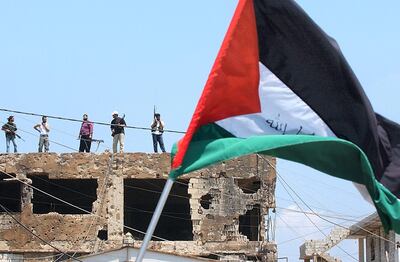
“The area is very unstable and the future is uncertain for everyone living here,” Ms Barakji said.
“Moving around the camp can be difficult. It seems ok at the moment but this can change very quickly if fights breakout between rival factions battling for control.
“I always have a grab bag with me ready to go at any time. It has my papers and identity cards and anything else I need in an emergency. My mother and grandmother have always done the same.”
The National interviewed workers at Burj Al Barajneh as part of its work with the Carter Centre, a US NGO founded by former president Jimmy Carter and his wife Rosalynn to improve understanding of mental health needs in the Middle East.
Over recent decades, civil wars in the region have decimated many communities, forcing millions to abandon their homes and begin new lives elsewhere. One potential legacy of the fighting is a spike in serious mental health related problems among those affected.
Psychologists working inside Burj Al Barajneh have long said the violence in the camps is often a direct result of a failure to address stress, depression or anxiety.
Since the ICRC began working with men and women like Ms Barakji last year, the benefits of teaching wide-ranging coping mechanisms have become clear.
“This is the reality of my life, I have no choice,” Ms Barakji said. “It is hard to process this way of life - it’s just survival for us; what we are used to.
“I always recognised it would have an impact on me, but I didn't know how to deal with it.”
Mother-of-three, Mariam, who did not want to give her full name, works as a nurse in clinics at a number of camps in southern Beirut.
The types of trauma she is called on to assist with include gunshot wounds, electrocutions - faulty and exposed wiring is a common hazard in the camps - as well as injuries caused by buildings which have collapsed due to poor construction.
Given the stresses of her role, she was also chosen by the ICRC to be part of the Help the Helpers programme.
"I have learned coping mechanisms to help me deal with the things I see every day," she told The National.
“They are traumatic, but maybe I haven’t recognised that before as they’re so commonplace.
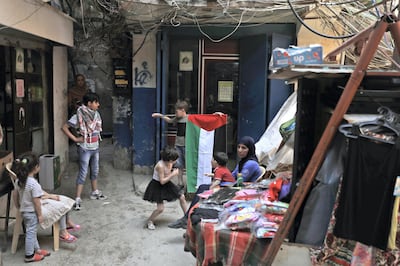
“It is difficult when people are aggressive. I didn’t have any training when I was learning to be a nurse on how to deal with these type of situations.
“I have heard the word stress, but I did not really recognise it until now. I used to take it out on my family but now I know my limits and when I should stop.”
Elie Sarkis, 31, has worked in mental health for seven years and now works for the ICRC as a clinical psychologist and psychotherapist.
“There are situations where health care workers and first responders often face traumatic and stressful situations,” he said.
“The need [for our assistance] is there, to help them deal with the day-to-day violence they see in hospitals and clinics.
“We’re helping them cope with what they see and process these situations for when they go home to their personal lives.”
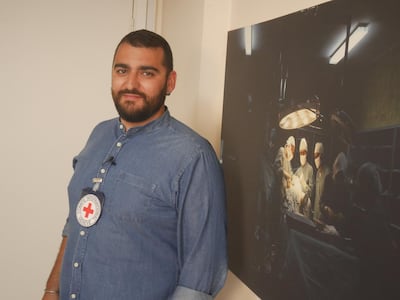
Mr Sarkis has been working with the Help the Helpers programme since its inception in August 2018.
Those taking part in the scheme attend a total of eight sessions, the first six of which help highlight how to deal with more common, less serious, trauma and the stress it can create.
Later on, the course tackles more major emergencies, including how best to treat violent patients or those with life-threatening injuries.
“Helpers face tough scenarios,” said Mr Sarkis, giving a hypothetical example of a Syrian and Palestinian patient needing treatment at the same time with limited resources.
“They must treat whoever is in most need, but people (families) do not always understand.
“We help [health workers] process [the trauma] so they’re able to leave work behind when then go home for the day.”
Aid groups deliver critical mental health support
In a country with 25 per cent unemployment, sectarian violence and more than 1.5 million refugees, mental health spending is simply not a top priority.
High levels of debt amassed over a 15-year-civil war coupled with ongoing regional conflict are perhaps rightly considered a more urgent concern.
But the Lebanese government’s mounting economic woes have left health authorities in the country in a particularly fragile state.
Increasing budgetary constraints have meant they have become more and more reliant on humanitarian groups to provide essential care.
One such organisation is Medicins Sans Frontieres, the French NGO that operates 13 clinics in Lebanon.
Seven of its centres also offer mental health services, a growing public issue owing to the ongoing hardships that so many residents face.
“We do not discriminate but our work is targeted towards migrant workers; Syrians and Palestinians,” said Jacqueline Kamel, MSF’s mental health activity manager.
“These people don’t have access to health insurance or an income and have no disposable money to pay for healthcare.”
Ms Kamel said co-operation between the Lebanese government, charities and NGOs was crucial to delivering effective treatment to those in need.
Over recent years, the country has taken in hundreds of thousands of refugees, leaving many already struggling government services inundated.
Most of the displaced arrived from war-torn Syria following the start of its civil war in 2011.
But many Palestinian refugees have lived in Lebanon camps far longer, first arriving in 1948 following the Arab-Israeli war.
The MSF currently has five programmes operating inside the settlements, with cases of depression and anxiety among the more common diagnoses.
“The need is clear and pronounced,” said Ms Kamel. “Stigma towards mental health exists, like anywhere else in the world.
“The north is very close to Syria, so 40 per cent of our cohort is made up of children [as so many children arrived from the country].
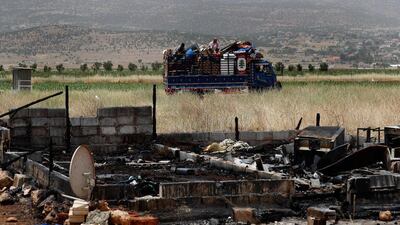
“We see a lot of behavioural issues and post-traumatic stress related issues [such as where] children have become incontinent.”
Common adult health problems also include psychosis, depression and anxiety, according to medics.
In the worst cases, emotions can become so confused that all contact with reality is lost.
Significantly, too, the majority of patients needing mental health treatment are women, suggesting men are still reluctant to come forward.
“Women are often the anchor of the family and will influence most of the relatives, although the decision maker will still be the male - if there is one in the household,” said Ms Kamel.
“Many people are facing overcrowding and violence in the camps [as well as] poor hygiene and sanitation.
“Some children do not have access to proper shelter or the most basic needs, so are growing up in vulnerable situations.
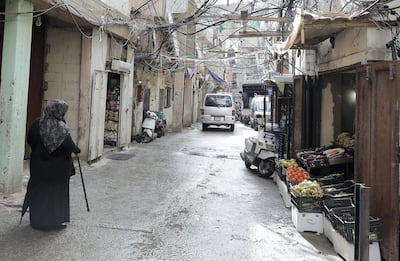
“Camps can be volatile, which makes community outreach difficult.”
Close to 45 mental health staff are currently working across Lebanon for MSF.
Settlements are not controlled by the government, so many are self-governing with security organised internally via differing factions and armed militia.
In Burj Al Barajneh, south Beirut, about 18 such groups exist, often with conflicting agendas and alternating loyalties. At times they clash, bringing violence to the streets.
“In the Palestinian camps we’re seeing the fourth generation to have grown up there without citizenship or ID cards,” said Ms Kamel.
“Many [of the refugees] have never been outside of the camp. It’s [a] unique [situation] as they have suffered a loss of identity.
“The Arab culture is focused on the nuclear family and how they interact with the world through their success, influence and status.
“When that breaks down it can be confusing and leads to a lot of issues.”
